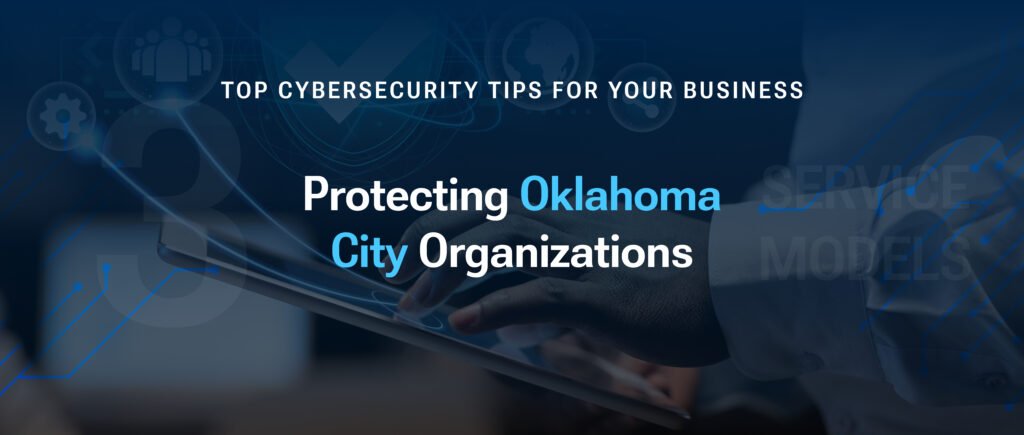Running a business in Oklahoma City is challenging enough without having to worry about cyber threats. But here’s the reality: cybercriminals aren’t just targeting large corporations anymore. They’ve realized that smaller businesses often have fewer defenses, but still hold valuable data.
The Hard Truth: When a data breach happens, it typically costs around $4.35 million. For most of us local business owners, that’s not just a statistic, it could mean the end of everything we’ve built.
I’m writing this guide because I’ve seen too many fellow Oklahoma entrepreneurs learn these lessons the hard way. Good security isn’t just an IT thing, it’s about protecting everything you’ve worked so hard to build. Let’s talk about practical steps that won’t require a computer science degree to implement.
What Cyber Security Threats Look Like in Oklahoma City
Before we jump into solutions, let’s talk about the real-world cyber risks Oklahoma businesses face today:
- Ransomware attacks that lock you out of your systems until you pay a ransom
- Phishing emails that fool even savvy employees into clicking on malicious links
- Third-party vulnerabilities, where a vendor’s security weakness becomes your problem
- Insider threats, whether accidental or intentional
- Compliance violations that lead to regulatory fines and legal action
The challenge? These threats evolve constantly. Just when you think you’re secure, new risks emerge.
Five Practical Security Tips for Oklahoma City Businesses
1. Move Beyond “Password123”
Weak or reused passwords remain one of the most common causes of breaches. Multi-factor authentication (MFA) is the simplest, most effective upgrade you can make today.
What this looks like:
- Confirming logins via an app on your phone
- Enabling MFA for email, cloud tools, and remote access
- Using authenticator apps instead of text messages
- Reviewing who has access to your systems on a regular basis
I was helping a local retail shop owner last month who thought MFA would be too complicated. We had it running in under an hour, and it stopped an unauthorized login attempt the very next week. Sometimes the simplest changes make the biggest difference.
2. Turn Your Team Into Security Allies
Your employees aren’t trying to create security problems—they just don’t always know what to watch for. With some straightforward training, they can become your first line of defense instead of your biggest vulnerability.
Training that sticks:
- Real-world phishing examples they’re likely to encounter
- Clear policies on how to handle customer and company data that make sense for their actual job
- Practical password advice they can follow without writing everything on sticky notes
- A judgment-free way to report suspicious activity
- Occasional simulations or “phishing tests”
3. Prepare for the Worst Day
You don’t want to find out during a crisis that your backups don’t work. A disaster recovery plan ensures business continuity even when something goes wrong.
A backup plan you can count on:
- Regular, automatic backups that store your data both locally and offsite
- Clear recovery timelines for each system
- Step-by-step recovery instructions that more than one person knows how to follow
- Regular tests to confirm your backup plan actually works
- A plan that fits with your overall approach to handling disruptions
I recently worked with an Oklahoma healthcare provider who discovered during a routine test that their backup system had been silently failing for months. That wake-up call led to a much more reliable solution, which literally saved their practice six months later when ransomware struck.
4. Protect Every Device, Everywhere
With so many of us working from home, coffee shops, or on the road, every laptop and phone that connects to your business needs protection. Modern security tools do much more than just scan for viruses.
Make sure you have:
- Security software that watches for suspicious behavior, not just known threats
- Application control to prevent unapproved software installs on company devices
- Encryption that protects your data if a device is lost or stolen
- Updates that happen automatically to close security holes quickly
- A central dashboard where you can see what’s happening across all devices
An Oklahoma law firm I advise had a laptop stolen from an attorney’s car last year. Because they had device encryption in place, what could have been a major client confidentiality breach became just the cost of replacing hardware.
5. Get a Second Set of Eyes
When you’re focused on running your business, it’s hard to see your own blind spots. regular cybersecurity assessments help you catch issues before bad actors do.
A strong security review will include:
- Testing how attackers could access your network—internally and externally
- Reviewing website and software vulnerabilities
- Evaluating physical security tied to digital systems
- Reviewing whether your policies are actually being followed
- Ensuring you’re meeting any industry compliance requirements
- An Oklahoma manufacturing firm discovered that production systems were publicly accessible—something they addressed immediately after a security assessment.
One local manufacturing company discovered during an assessment that their production systems were publicly accessible, a significant risk that they were able to address before it caused problems.
How to Make Cybersecurity Work for Your Business
You don’t have to do everything at once. Here’s a practical approach that won’t overwhelm you:
- Assess where you stand: You can’t fix what you haven’t measured
- Start with your biggest vulnerabilities: Focus on what would hurt your business most
- Tackle one step at a time: Cybersecurity is ongoing, not a one-week project
- Document your process: Keep procedures written so they survive staffing changes
- Review quarterly: Schedule reminders to check progress and adjust as needed
Many Oklahoma City businesses find peace of mind by partnering with a local security provider who understands the regional landscape, compliance requirements, and common threats.
Don’t Wait for a Wake-Up Call
I’ve sat across from too many business owners who said, “I wish I had done this sooner.” The truth is, cybercriminals love targeting smaller businesses precisely because they often lack robust protection.
At ANDGroup, we’re your neighbors here in Oklahoma City. We understand the unique challenges local businesses face because we face them too. Our approach to security is designed to provide serious protection that fits your budget and specific needs.
Let’s Talk: Schedule a friendly, no-pressure security assessment to identify your most pressing vulnerabilities. We’ll help you develop a practical plan to address them before they become costly problems.
Because the best time to strengthen your security was yesterday. The second best time is today.

